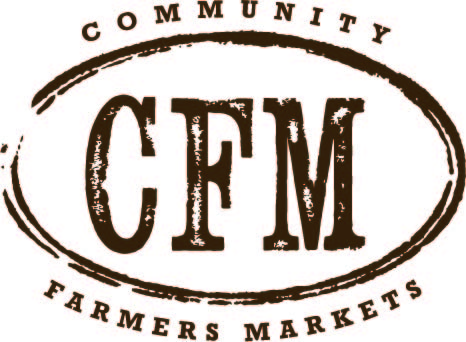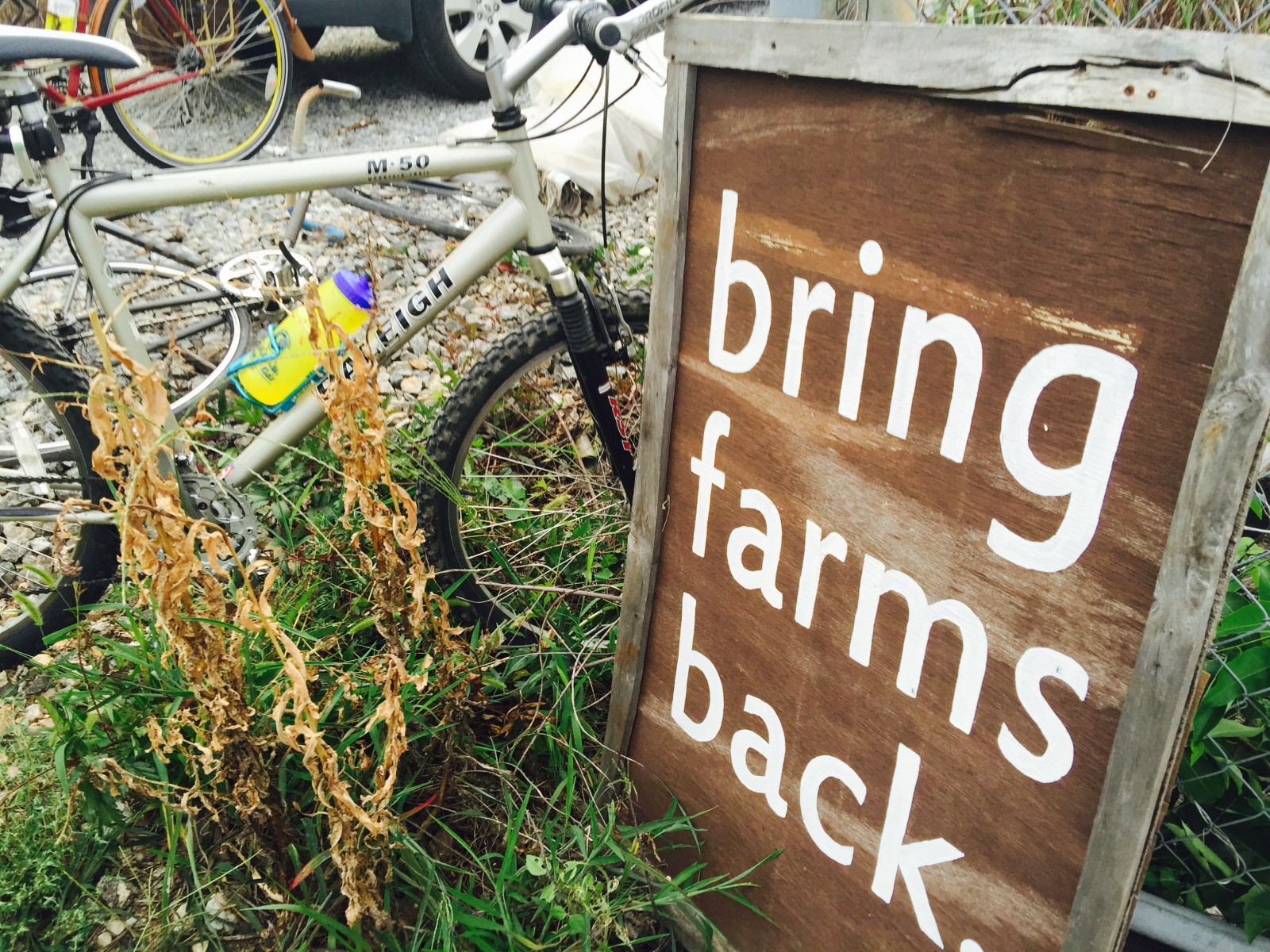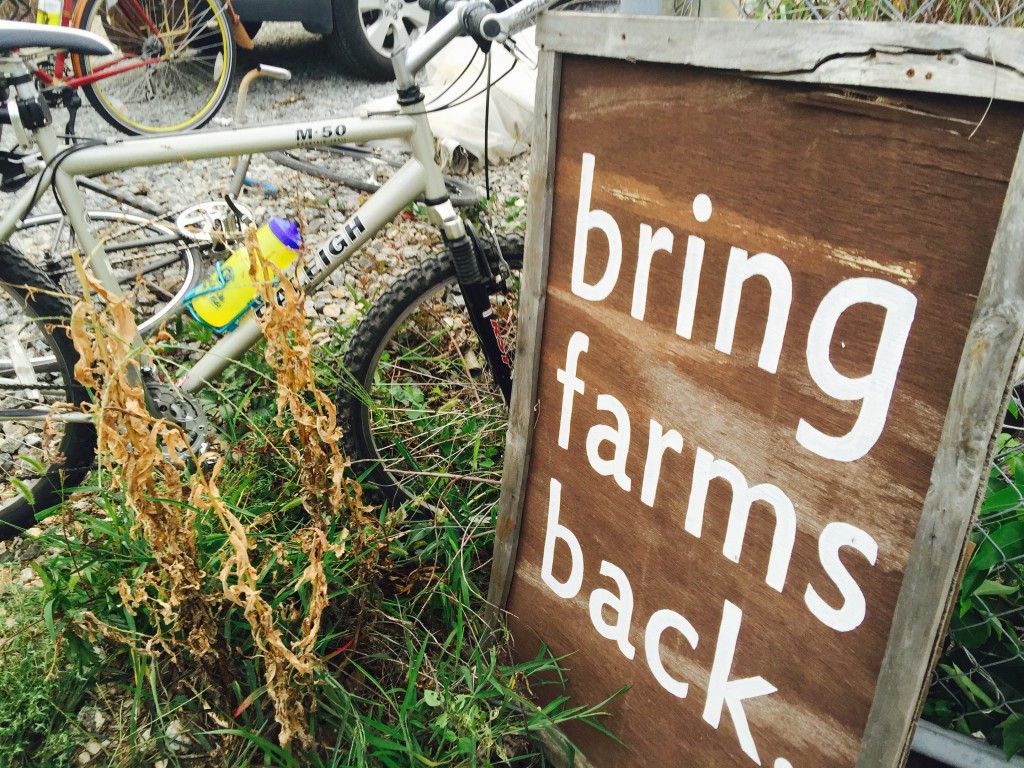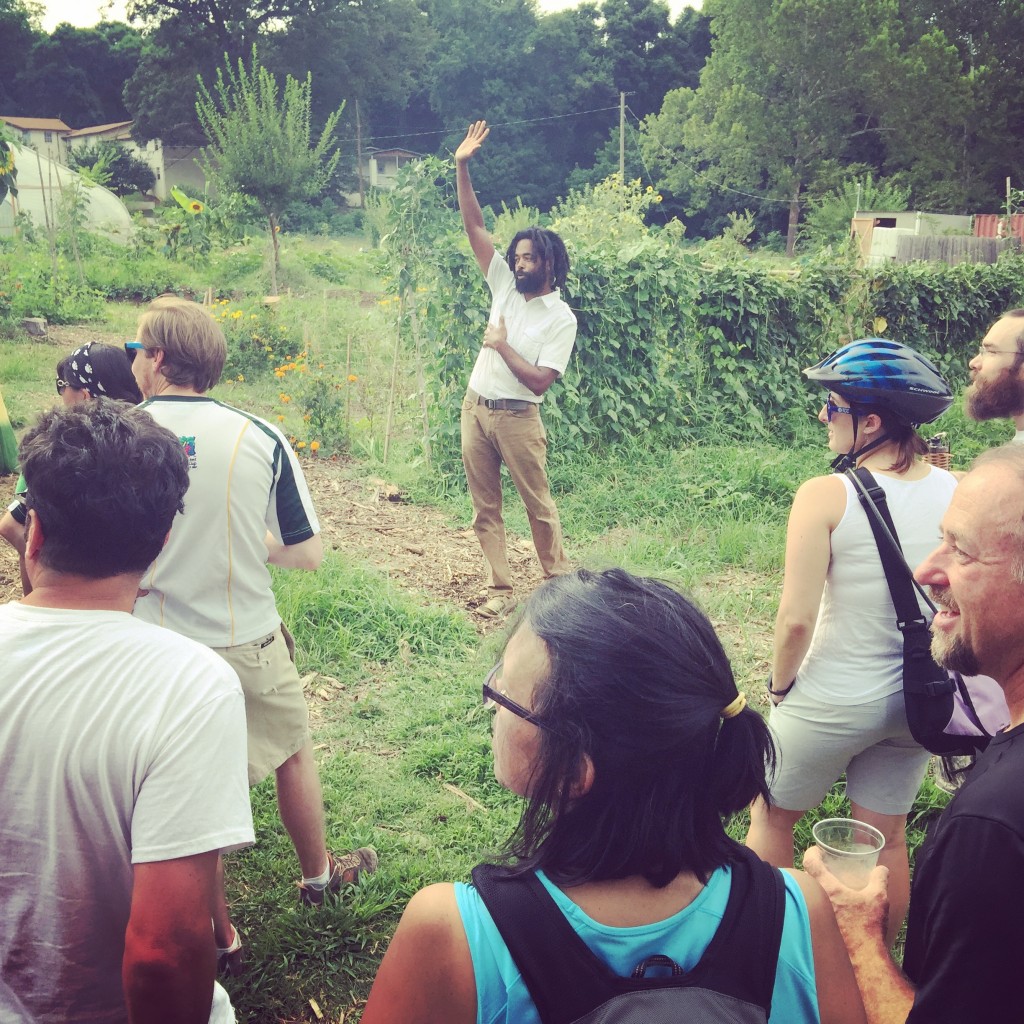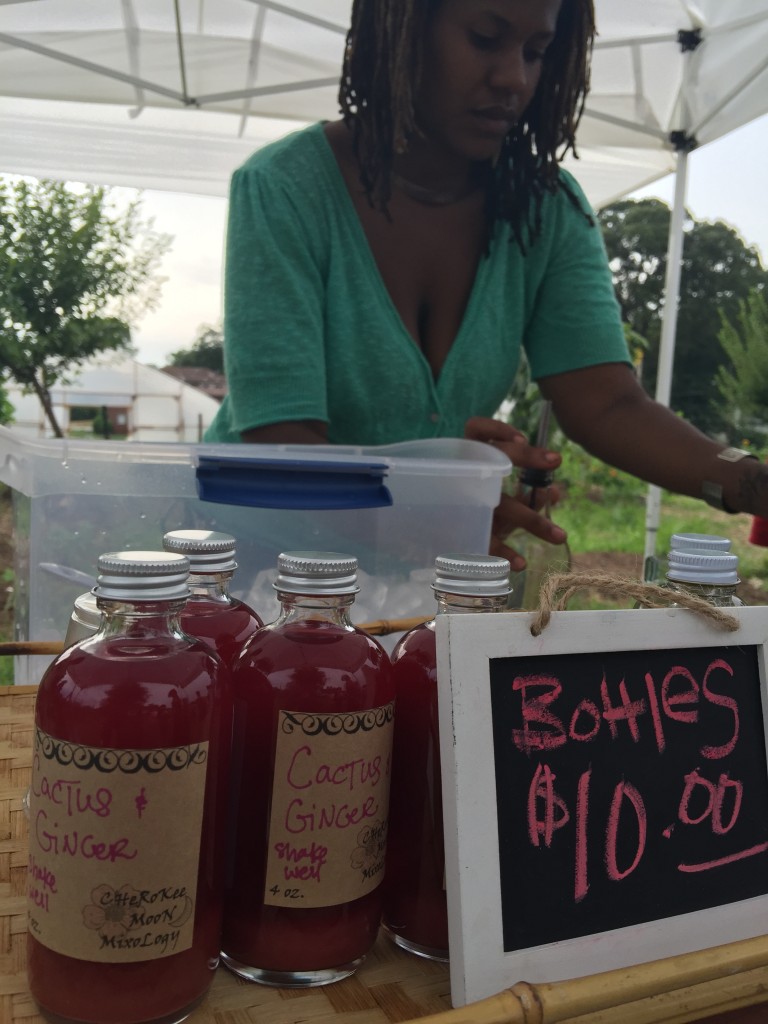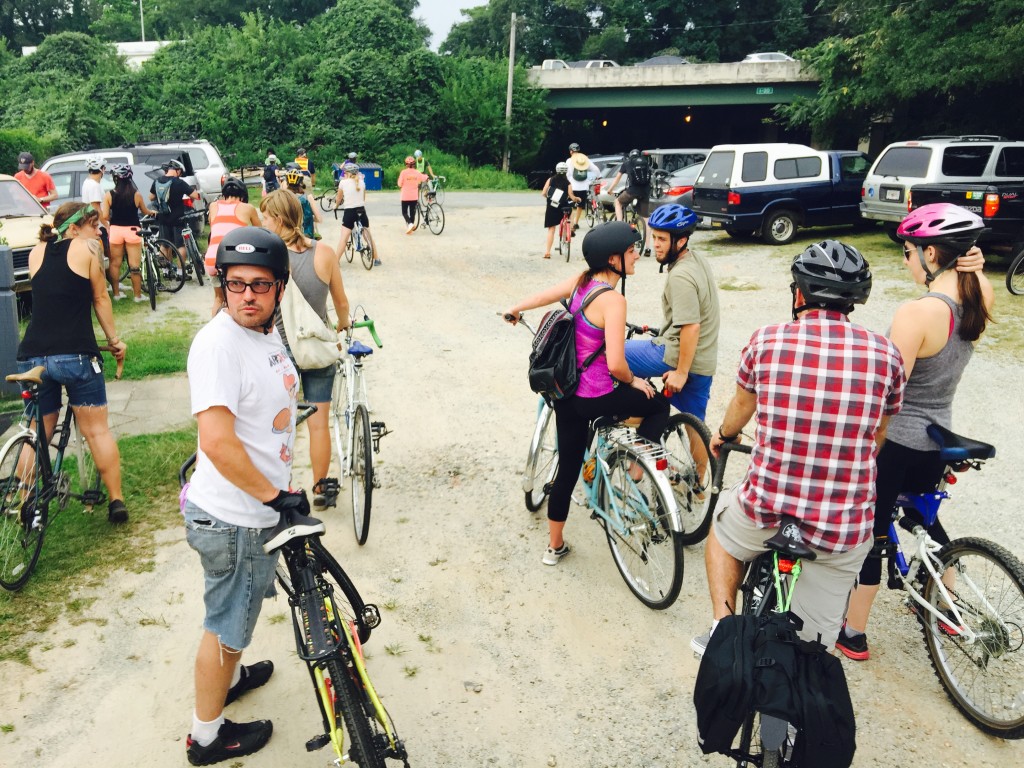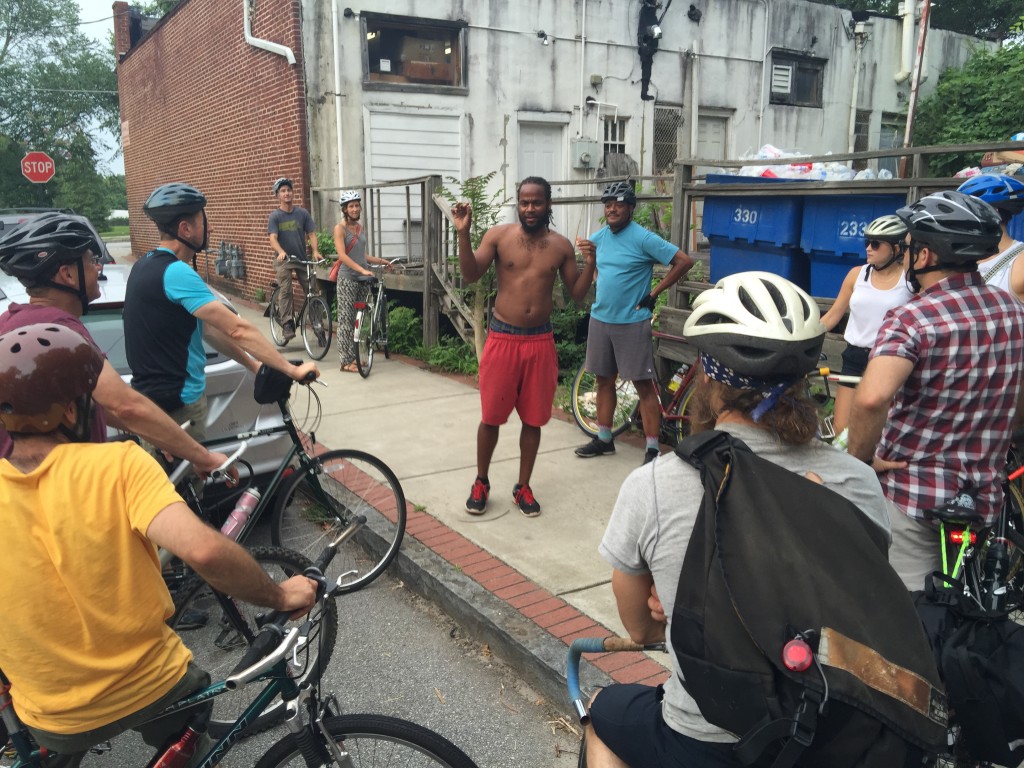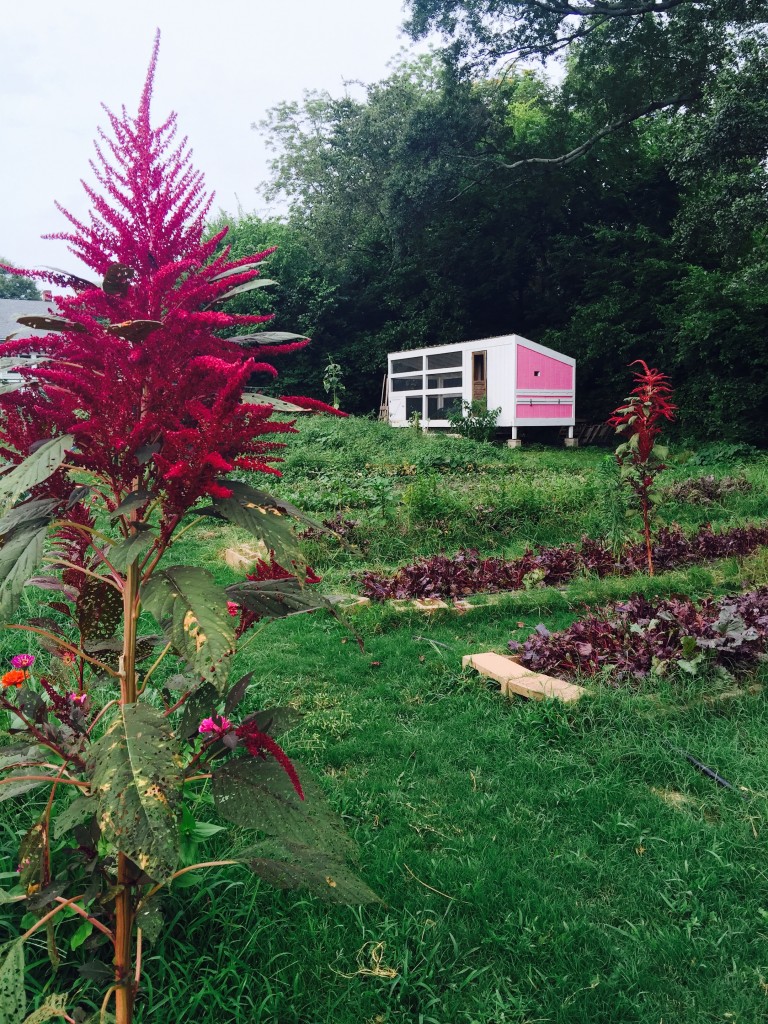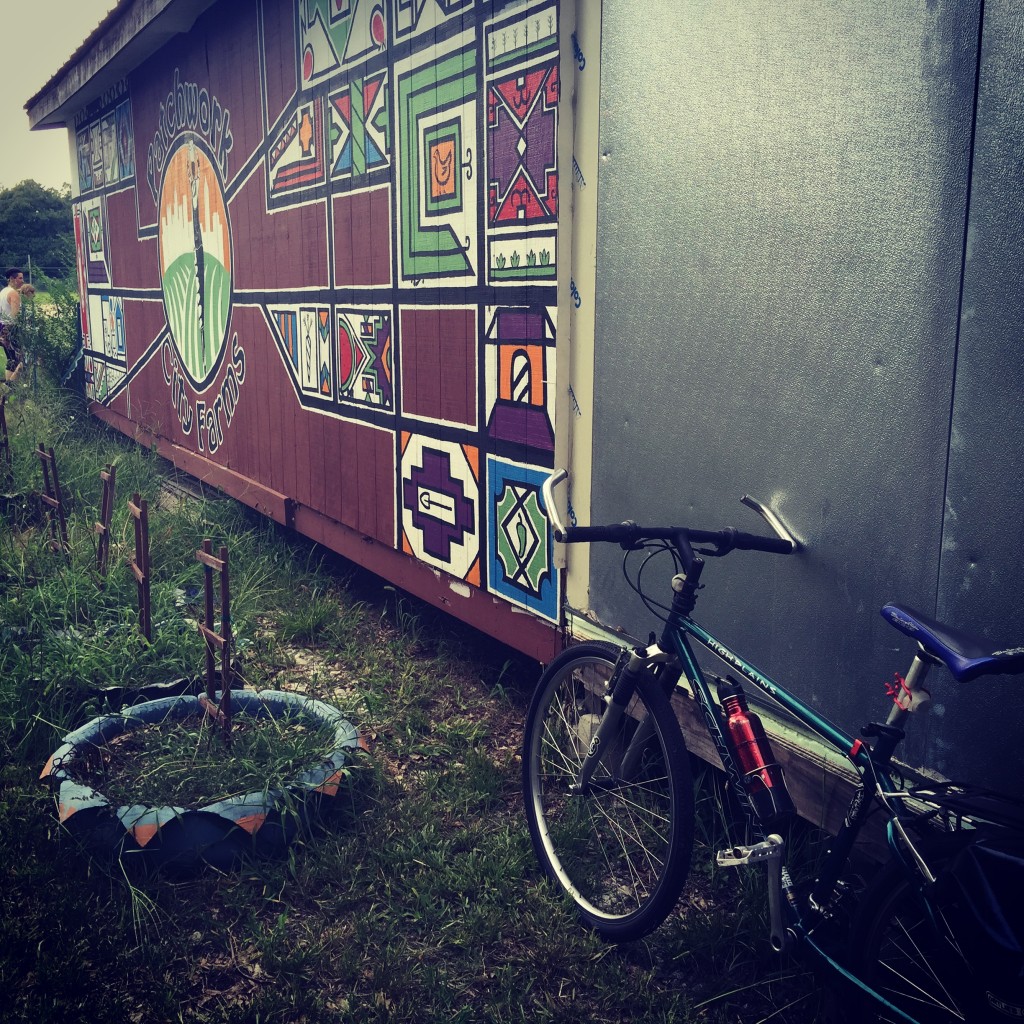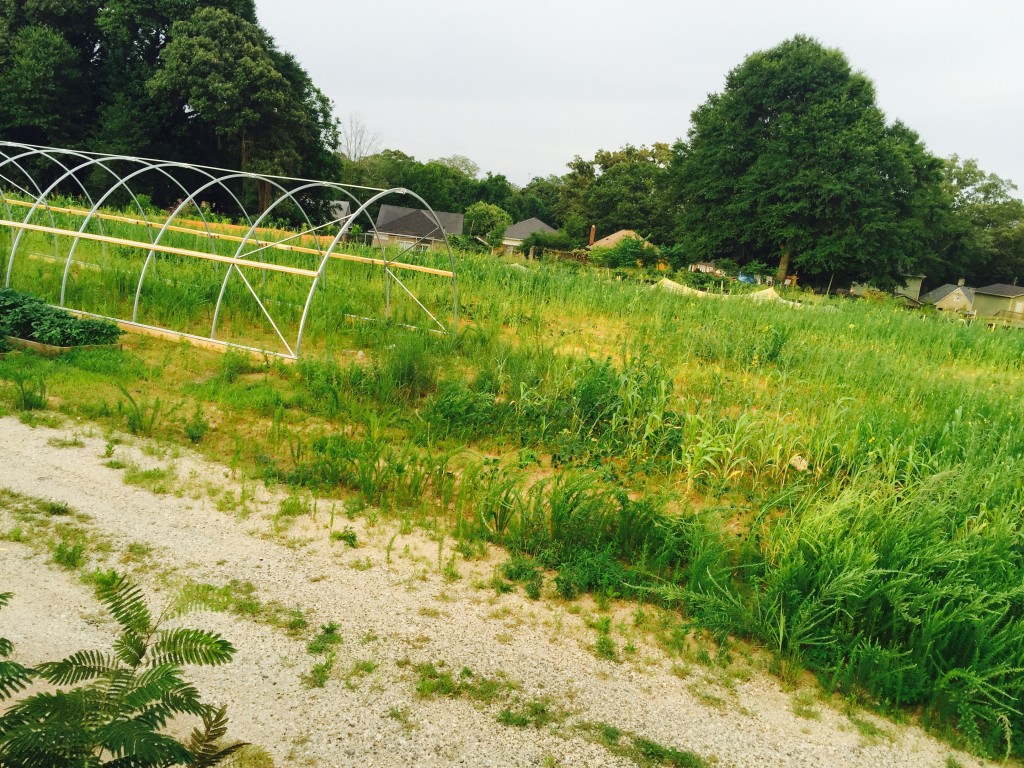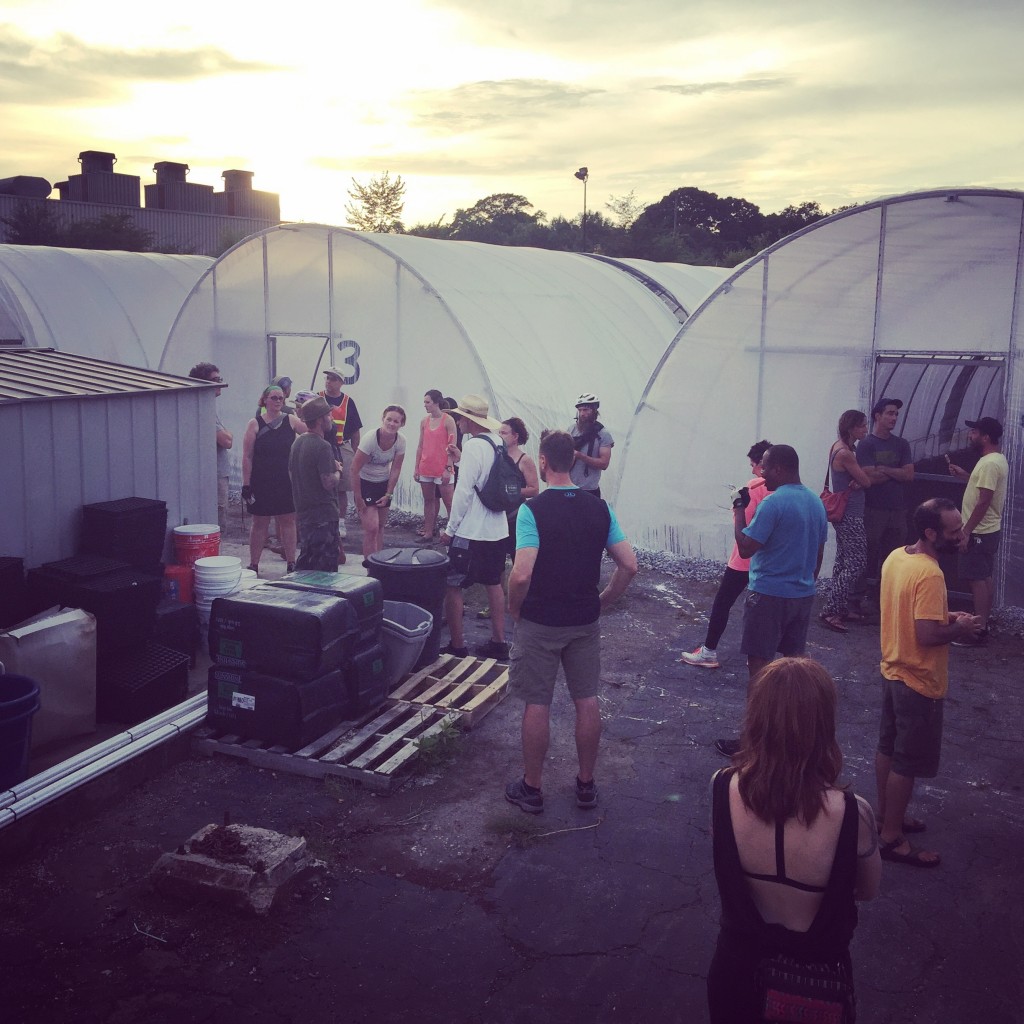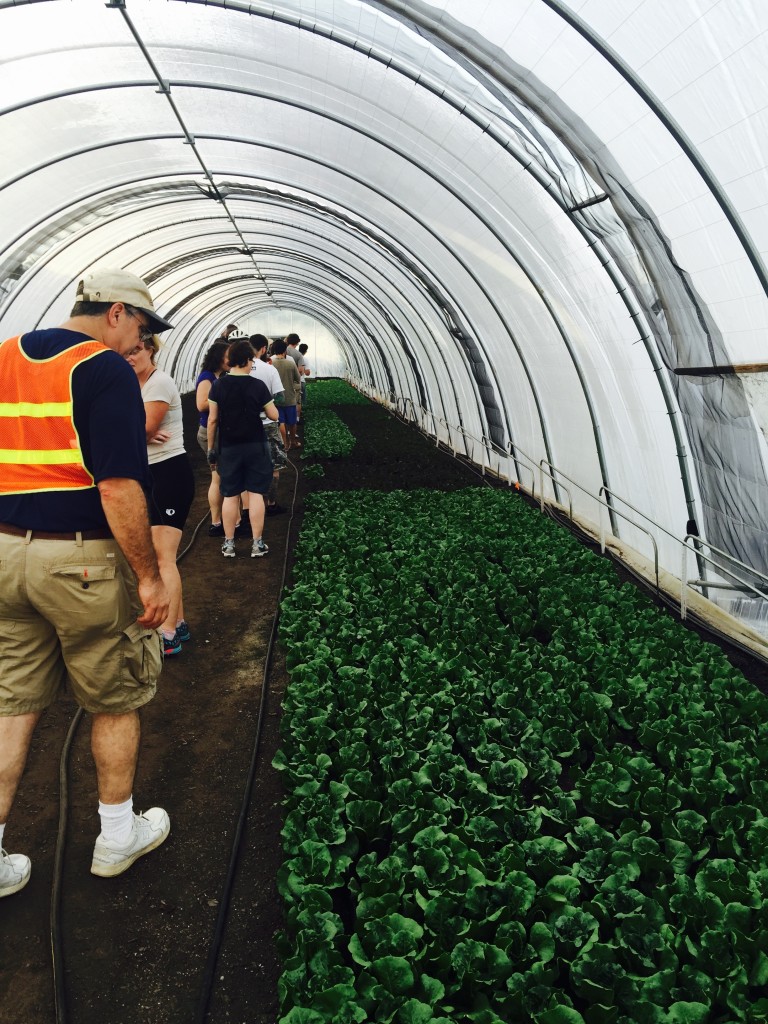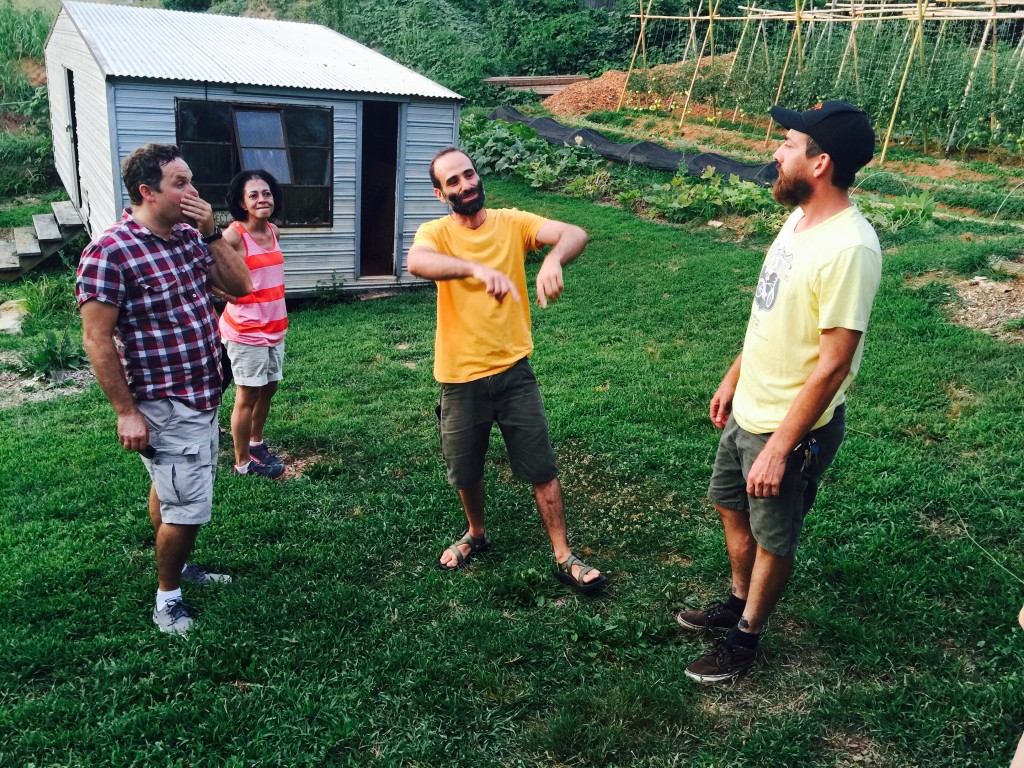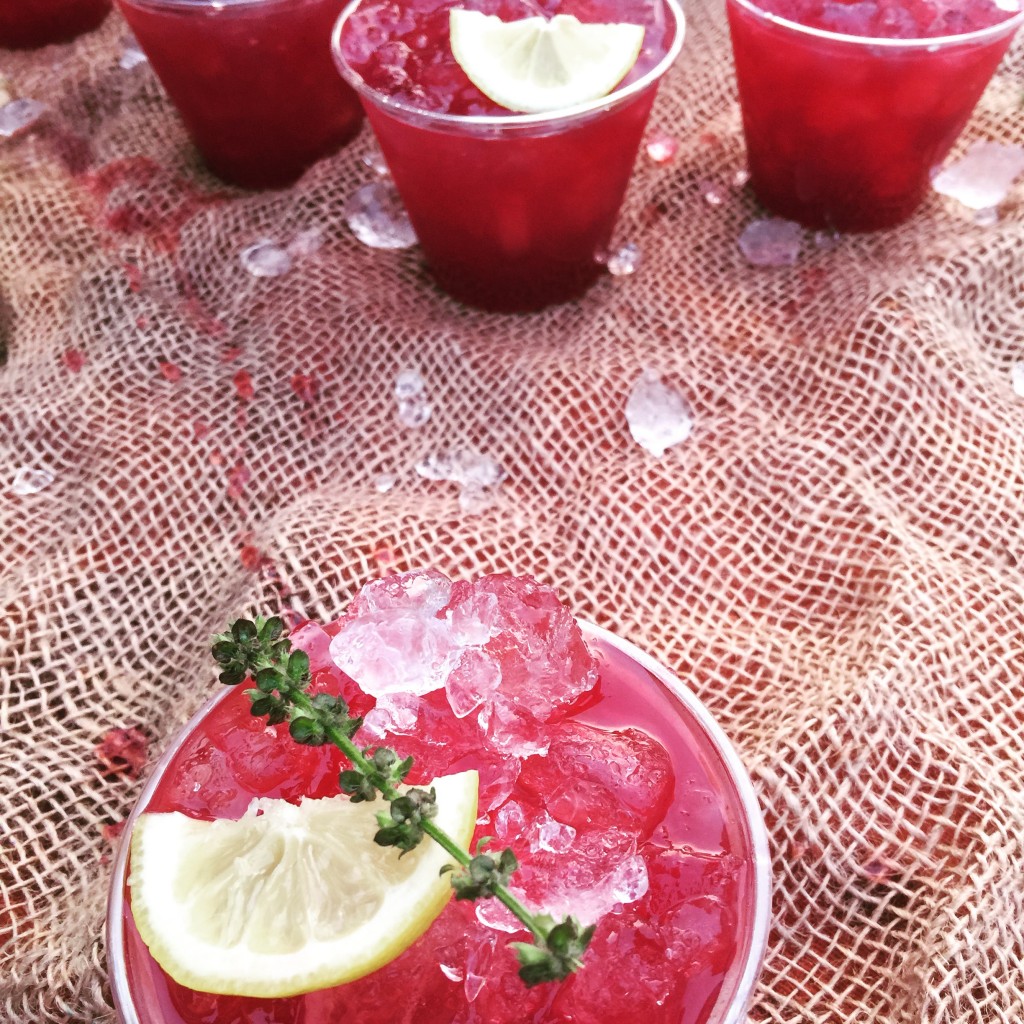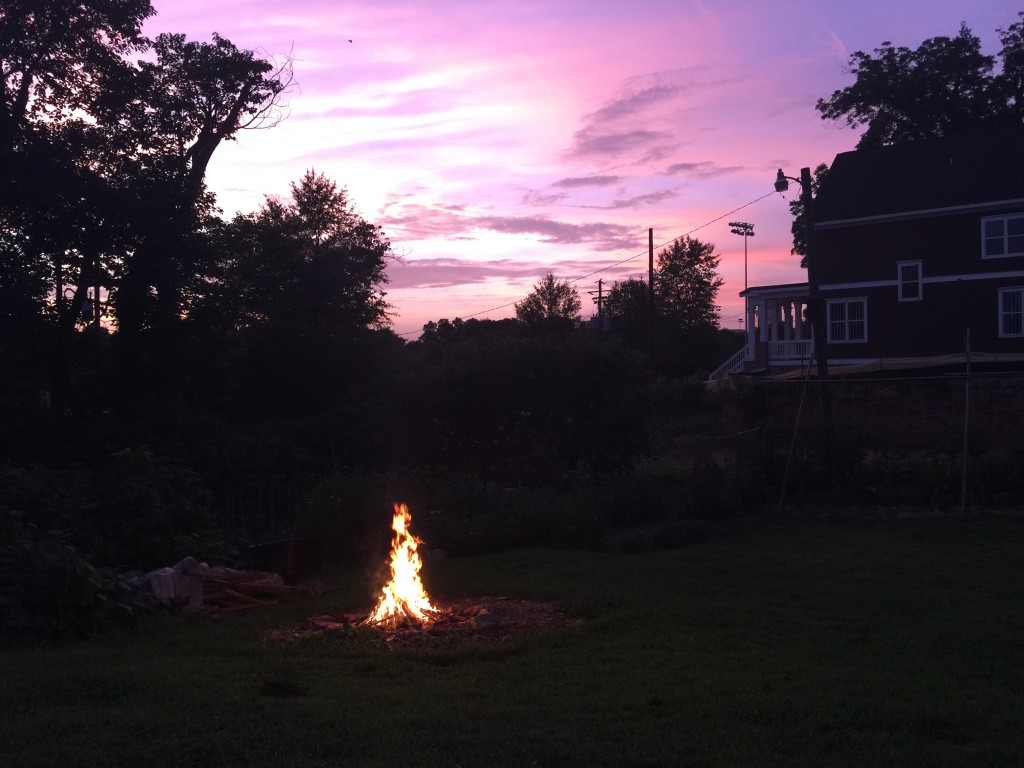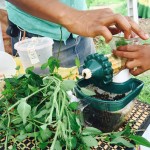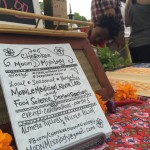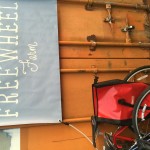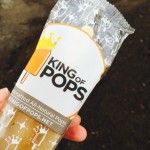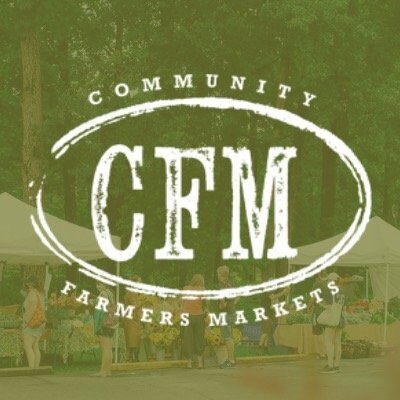We’re happy to welcome this story from Jess Collet, of Mind Your Peas & Food, about our recent Mid-Summer Night’s Farm Bike Tour, a bike tour of innovative urban ag projects in our city. Jess is a Registered Dietitian, who has been active in the food system in our greater community. We appreciate her approach to nutrition and the environment, complete with practical guidance, and like her richly-textured writing very much.
{writing & photos by Jess Collet}
Like a swarm of bees almost fifty cyclists amassed on the streets of southwest Atlanta last Saturday and pollinated local farms with thoughts on local food production in the city. It was a perfect summer evening. A pleasant breeze, just the right amount of city heat and later, gorgeous skies streaked with shades of orange, fuchsia and violet known only to summer sunsets.
The overarching purpose of the midsummer farm and bike tour was to highlight a handful of growers who are utilizing innovative means and limited spaces to grow food. Urbanization continues to grow, so the means to provide food for city dwellers, restauranteurs, and communities lacking food access remains high on the food movement agenda.
The meeting point was at Good Shepherd Agro Ecology Center, the brainchild of Gebsite founder Eugene Cooke and co-director Nicole Bluh. Eugene is a known face to the local food movement, having coined “Grow Where You Are” to empower communities to grow food in their own backyards. Cherokee Moon Mixology owners Almeta Tulloss, along with Nicole, distributed refreshing and revitalizing beverages, one being the Mimosa sunset, a deep pink concoction of mimosa flowers that faded into a wild blackberry and Damiana tincture. As folks sipped these nutritious drinks, Eugene described the conundrums regarding hemp production in the south. “Canada is capitalizing on this market, while we here in the south sit with ample land designated for pine tree production,” he explained. The south was a hemp producing region, and where sorghum grows, hemp will grow too. Maybe one day, but for now Eugene wishes to bridge urban food production with rural farms. “In doing so the higher overhead smaller urban farms are dealt could be lowered by larger rural farms,” he explained as folks took in the sights of a highly productive plot of land. He pointed to a mass of green leaves and asked the crowd what the plant was. When someone finally responded “sweet potatoes” the smile and appreciation was obvious in Eugene’s face. You could tell he digs folks who know a thing or two about growing food.
Before we headed off, Jonathan Tescher, organizer of the event and another accomplished figure in the food movement, described the gist of the evening. Cycling, safety, stops and fun. After a little cog greasing and air pressure checks folks were hopping on bikes in unison. Coordinating a cycling swarm took some resources, including cyclists equipped to handle the terrain of urban roads because let’s face it, cycling in Atlanta can be a game of dodge ball. Safety is a core issue inherent to cycling in Atlanta, and besides a smattering of bike lanes, the city has a ways to go in encouraging drivers to ‘share the road’. After one last reminder of cycling etiquette, the surrounding early evening air buzzed with the sound of spinning wheels and chiming bells.
The first stop, but a couple of blocks away, is a small operation tucked into the neighborhood. Wecycle Atlanta works with the local community to provide access to bicycles as an environmentally-friendly means to transport. In addition to this, they also provide access to local food and basic agricultural training for youths. “With our limited space, we get kids to make gardens using these crates,” explained Shawn Deangelo Walton, CEO of Wecycle Atlanta. The crates are mobile food-growers, so folks can move these to their yards or wherever they need them. It’s a fledgling operation but one brimming with grassroots potential to alter transport and food environments of urban communities.
As we made our way to the next stop, it was obvious that the true beauty of cycling was the intimacy and interconnectedness between bike, rider, road and the surrounding environment. Cycling through the West End neighborhoods revealed historic homes, some a little dilapidated but shrouded in charm, nonetheless, others beautifully restored. Locals greeted and cheered the cyclists while the tree-lined streets resonated the chirruping cicadas. A reminder that exploration is best achieved by foot or bike.
Patchwork City Farms is an operation nurtured by a formidable mother of three, and full time engineer with the Georgia Department Natural Resources, Jamila Norman. The site sits on the grounds of Brown’s Middle School, which Jamila explained, has gone through transitions in leadership while the farm remained a consistent feature. Jamila described an obvious challenge in farming, irrigation. “Before we got funding from the USDA for our drip irrigation system, the watering operation would involve walks to the fire hydrant to connect and then disconnect hoses.” Her story was laced with reminiscing of challenging days gone by and challenging days on the horizon. “Those fruit trees you see? I’m going to have to move them as the school expands its parking lot,” she pointed out as she described how the farm has connected students with food production. Through funding from the Foodwell Alliance, the organization has acquired another lot of land with a historic home ripe for preservation. This will be a new learning facility to share with generations to come. For a woman who juggles a load, Jamila is truly a food warrior whose energy is contagious.
Evident enroute was the vibe of the West End. It’s waiting in anticipation for opportunities already in full blossom along the East side Beltline. When the Atlanta Beltline put out a request for a farm site on the West End, Andy Friedberg, whose background is environmental law, and his farming partner Andrea, jumped in on this. They were awarded a five year lease on a three acre site. Running alongside this site is the tell-tale clearing designated for the Beltline. “This was an automobile industrial site. We’ve cleaned it up, tested the soil, and we’re looking good to go,” he explained as a gentle breeze drifted through. The lot was a flourish with cover crops to enrich the impoverished soil. “As I studied and practiced law, I just kept coming back to farming,” Andy told me later in the evening, the urban ag bug clearly in his system. This is what the food movement truly is. Folks from all backgrounds making a choice to grow food, where they are. In the near future fresh produce will be harvested from Andy’s lot and collected on foot or by bike via the Beltline. Just another tremendous opportunity for neighboring communities to engage in and access healthy food using healthy means. After all, exercise pairs well with healthy food.
As the afternoon sank gradually into dusk, everyone was in good spirits as they cycled the longest stretch of the tour. The cycling guides ensured the group remained safe and coordinated in making turns or dodging potholes. Biking terms like ‘car up’ and ‘car back’ were heard throughout the ride to caution riders on traffic direction. Just this once, the roads were truly dominated by human kinetics.
We were directed a post-industrial site with remnants of factories and old railways. One couldn’t help but wonder what on earth could possibly be growing there. After turning another corner, we were all faced with a scene not far off from the ‘X-Files’. Six glowing white hoop houses of Atlanta Harvest, the dusk sky a perfect backdrop. Everyone was doled out a King of Pops popsicle (rumor has it they were the boozy kind) and as these were devoured the farm owners described the operations. In soil but a few inches thick on top of concrete were rows of lush green and purple lettuces. The true art of growing food under these conditions comes with trial and error “We needed more fans to aerate this crop house,” admitted Sarah Ann Horton, one of the farmers on site. “Since then we’re seeing far better yields,” she added, pointing out the thousands of sprouted lettuces and greens. In this urban environment where food is grown on top of concrete, hoop houses require environmental manipulation for maximal yields. It’s a truly ambitious project, and reminder that food can be grown almost anywhere.
While cycling to the final stop folks chatted about how these entities make a living or how these can be sustained. Other folks enjoyed the jovial exchange of humor or general conversation. It became increasingly obvious that the event achieved something else. Comraderies. Sharing or making friends means building communities, critical for maintaining the momentum of the food movement.
On arrival at the final stop, Brent Hall, also one of the cycling guides, welcomed us to his growing project Freewheel Farm. We were encouraged to walk around and ask questions. Brent made it pretty clear it was time to chill. One couldn’t help but feel excited seeing the burgeoning tomato bushes. Summertime tomatoes were featured in the side to the scrumpious Doggy Dogg hotdogs and trimmings. A final libation of bourbon, added to a base of blueberry and basil made by well known herbalist, Cara Sheffield, were served. Cara had a stint at Little Vinyl Lounge and is continuing her studies in nutrition.
The grass made perfect seating, and as the gorgeous sunset was met by a bonfire, local musicians Max Godfrey and Maggie Hall, who are making waves in the folk music scene, sang folk songs to a merry fiddle. Watching the day fade away on a small lot of neighborhood land donated for this farming operation left one feeling rather optimistic that the local food, and its sweeping movement, are here to stay.
- Mint Juicing
- Chilling with King of Pops
